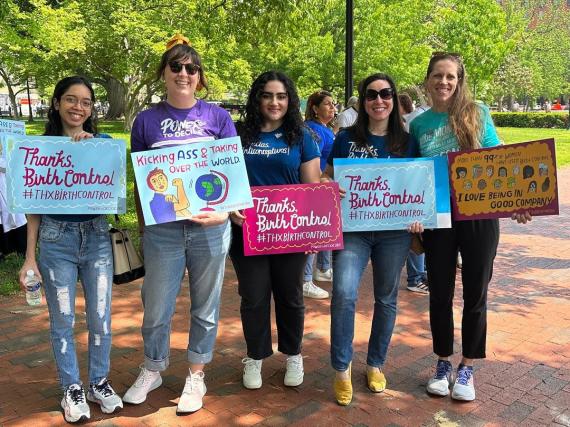Hearing Unasked Questions
My family can be reluctant to talk about big things. Perhaps yours is too. We love each other, we’re close, and we have dinner together every Sunday, but we’re not the type to hug it out and talk about our feelings a lot. But that doesn’t mean that my parents didn’t pay attention as I grew up and notice when it was time to open important conversations about sex, relationships, and my body.
For example, my mom knew I wasn’t likely to want to tell her when I got my first period. She casually told me that I could get my ears pierced when my period arrived; a great deal for both of us. I got my ears pierced (which I really, really wanted) and she ensured she’d find out about my period. She used the drive to talk to me about what was happening to my body, what to expect, and what she experienced. It didn’t take long to get to the mall, but it was long enough for me to get an idea of what questions I might have later on and learn that my mom was a safe person to bring my questions to.
Recently, I shared this story with a coworker who told me that their mom had a saying for these moments, “When the student is ready, the teacher will hear.”
How can you be ready to hear those unasked questions from the young people in your life? Here are five clues:
Are they telling you stories about friends’ new experiences?
First, congrats for having the kind of relationship with your young person where they want to tell you about their day and the goings on of their own lives and those of their friends. While they talk, keep your ears perked for moments in these stories that could lead into a meaningful conversation about sex, love, puberty, or relationships.
“I did this a bunch as a middle school student and I didn’t realize that it was what I was doing,” said Anna, a fellow at Power to Decide. “Thinking about it now, I wish it had opened up more conversation with my parents.”
Are the people they follow/are friends with on social media posting more mature content?
In an age where so many post their every movement and thought somewhere on social media, it’s important to stay aware of your young person’s activities online. You should be honest about the kind of privacy they can expect on their accounts and let them know if you’re going to peek into their feed, DMs, or following/followers.
But getting a handle on what your teen is seeing regularly online can help you understand what ideas they’re being exposed to and make sure that you can give them the context they need to stay in control of new situations. This is also an opportunity for you to ask some questions or raise concerns to gauge how they’re processing everything they see.
Are they watching TV shows or movies and reading books or graphic novels where relationships or sex is portrayed?
“I remember I read Twilight in middle school and felt like it was the sexiest thing I’d ever encountered. But my mom didn’t read them and didn’t know,” Anna shared.
By taking a peek into the media your young person enjoys you can get a sense of their interests and some potential prompts to start talking.
Marisa, a mom of two teens, loves using TV for just this. “One of the best ways I’ve found to open up these conversations with my teenagers is to point to something in pop culture before easing into a more personal, relevant discussion with less heat and pressure.”
Are they expressing a desire for more privacy or body boundaries from you or others at home?
It’s normal for teens to want more privacy from parents, younger siblings, and others as they get older. If you notice that they’re shutting their bedroom door more often, not wanting to share a bathroom, or keeping their earbuds in while in common spaces, it may be a good time to talk about how they’re feeling and assess expectations about privacy, boundaries, and consent.
Are other family members or close community experiencing new relationships or life changes?
“I (and probably a lot of kids) was a lot more observant than my parents gave me credit for,” Erika, a Power to Decide fellow, shared.
When a parent, sibling, cousin, aunt or uncle, or close family friend gets into a new relationship or experiences a life change such as a birth, death, marriage, or divorce, it can raise a lot of questions from young people. Changes those others are going through can make for a solid starting point to talk about what your young person wants for themselves and to learn how they’re feeling right now.
Be patient, keep your ears and eyes open for those unverbalized or unconscious signs that your young person has questions or wants to talk, and remember, you’re more powerful than you think!



